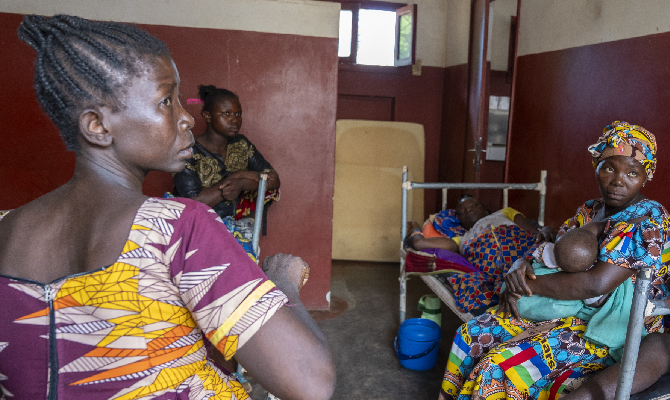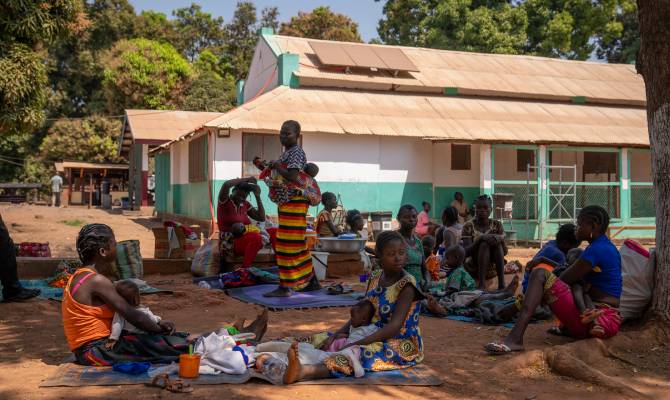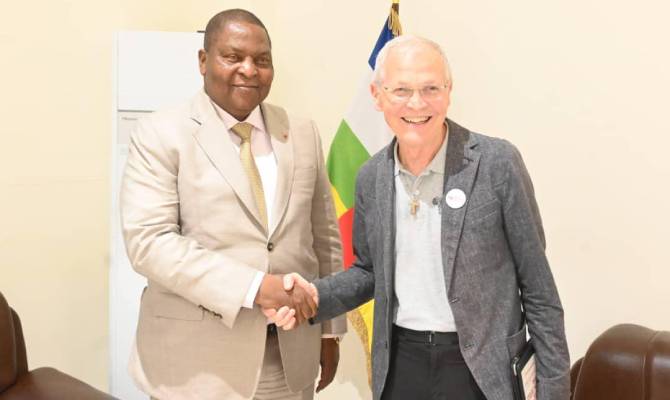«Fiacre had been suffering drom diharrea and high temperature for days – says Christelle. I had heard from the radio that this health centre was offering children under 5 years of age free care and also acquitances from the villages told me that so I decided to bring him here to see a doctor».
Christelle is 21 years old. She lives with her husdband and two children in Sembre 3 neighborhood, Bossangoa, Central African Republic. She runs a “table” a small business at the market, he is a motorbike driver, this is what gives them support. Yet, selling oil, salt and flour ain’t sufficient to afford healthcare in case of emergency.
According to the Global Burden of Disease 2020 (GBD), the majority of the population of the Central African Republic pays out of pocket (OOP) for health services ($18.39 out of a total of $30, or 61.30%), and OOP payments represent a major economic burden for families in CAR, where mor than 3 million people live in extreme poverty
This is why it is pivotal to support the Ministry of Health and Population (MSP) in implementing national policies and strategies to increase the capacity of the health system to offer quality health services without burdening patients, at least the most vulnerable. One of these strategies is performance-based financing (PBF). The aim of this strategy is to encourage improvements in the efficiency and effectiveness of health systems, while at the same time promoting the autonomous management of health facilities (FOSA).
Thanks to the iniziative funded by the European Union, Doctors with Africa CUAMM is adopting PBF strategy in the districts of Bossangoa, Bangassou and Ouango Gambo therefore offering free care in 41 health facilities (FOSA).
The Integrated Dispensary at Bossangoa Regional University Hospital, where Christelle sought assistance, is one of the facilities supported by the program. On June 16, Fiacre – 1 year and 6 months old was hospitalized due to a malaria. After receiving the diagnosis, the boy was timely treated and a follow-up appointment was scheduled to check on his health status after dismissal hence ensure quality health assistance. Thanks to the PBF, his family had to pay nothing for the service.
The PBF strategy has the potential to catalyse reforms to address certain structural weaknesses in health systems by remunerating providers based on their performance and needs assessed. In this way, health centres have enough resources to guarantee the functioning of the services without charging the patients, especially children under 5 years of age, pregnant womena and vulnerable groups who can now access free healthcare services.
By ensuring that health facilities receive the resources commensurate with their performance, the action aims to: support the provision of the minimum package of activities (PMA) and the complementary package of activities (PCA) defined by the Ministry of Health and Population and relating to sexual and reproductive health, maternal, neonatal, infant and child, adolescent health and nutrition (SRMNIA-N); bring services closer to the population through the implementation of community health strategies; strengthen the referral and counter-referral system.





